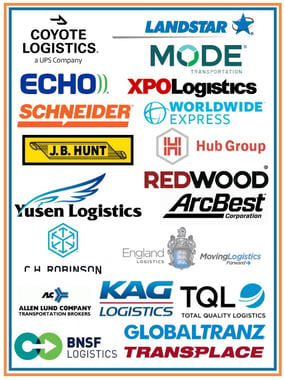
 Freight brokers play a critical role in the execution of a company’s strategic and operational strategies associated with its logistics and supply chain.
Freight brokers play a critical role in the execution of a company’s strategic and operational strategies associated with its logistics and supply chain.
Freight brokers bring efficiency to the highly fragmented truckload market by connecting motor freight carriers that have capacity with shippers that need capacity, whether that is for a one-time shipment requirement or to supplement deficiency of the company’s routing guide on a particular day.
The larger freight brokerage operations take an even greater role in bringing efficiency to companies’ logistics and supply through their people, process and technology to offer high end customized services for businesses to outsource a portion or all of their freight capacity requirements through their freight management service solutions.
While many shippers recognize they need a freight broker for the reasons outlined, they often avoid them at all costs because of negative experiences in service, pricing, claims or communication.
The intent of this article is to help shippers identify red flags that would steer them away from a freight broker that may not be a good fit for their business.
So. let’s start with the main issues shippers have shared with us over the years as to what their frustrations have been when dealing with a freight brokers or non-asset freight provider:
- The relationship is transactional, not a business partnership.
- A subset of the above is the shipper receives only the service they asked for on a particular topic and they want to hear alternatives and creative solutions to their logistics issues.
- The on-time pick-up and delivery performance is consistently inconsistent.
- Pricing is all over the board and they do not understand why and as a result feel taken at different times of the business relationship.
- The freight broker does not provide the necessary freight capacity when called upon.
- To compound this topic, the freight broker has been robo calling them and pounding their email with how they are better than the rest in providing freight capacity at the best price.
- Technology is not up to what the business requires.
- The communication from the freight broker is not proactive when problems arise.
All of the above drive distrust and often sends the shipper - broker relationship in a downward spiral.
While the majority of problems that drive frustrating broker experiences for shippers come from the freight broker themself, there are a handful that are driven by the shipper. We'll look at the situation from both perspectives over the next several paragraphs.
Problem with Many Freight Brokerages

Below are factors in the freight brokerage market that can cause service and price frustrations for shippers and while the intent of the below actions are to drive a higher level of service and more competitive pricing some freight brokers can and do stumble in their execution. Also, some situations, like thinking freight service is a commodity, is a mistake by both freight brokers and shippers to identify shipping freight in such a manner.
Top 5 Problems with Many Freight Brokerage Companies
- Commoditization of the Service
- Digitalization of the Operations
- Solution is Price Based versus Pain Point in the Business Based
- Financially Strapped Operations
- Operations is under a Commission Structure that Supports Volume, Not Service
Commoditization of the Service
If your email box is anything like mine, it is populated with multiple emails from various freight brokers telling you how easy it would be to sign up on their website to begin receiving competitive freight quotes with second to none service levels.
Too good to be true … probably.
These marketing emails are not only bothersome, but hurt the freight broker industry by perpetuating the thinking that freight is a commodity buy. It gives readers the impression that "product freight" is exactly like "people freight", so come along and book your next shipment with Freightpedia.com or Freightolocity.com.
The long and short of it is buying truckload, intermodal, LTL or any other freight service is significantly different than buying an airline ticket and by the way how often has your travel plans gone without a hitch.
The below characteristics are why there is not a Freightpedia.com or Freightolocity.com:
 Airlines have set schedules on set lanes, not an infinite number of origins against an infinite number of destinations that freight service providers have to service between hours specified by their buyer.
Airlines have set schedules on set lanes, not an infinite number of origins against an infinite number of destinations that freight service providers have to service between hours specified by their buyer. - The airline industry comprises less than ten major domestic airlines, which is in direct contrast with the 700,000 motor carriers in operation with 91.0% operating 6 or fewer trucks and 97.3% operating fewer than 20 trucks.
- Each airport the airlines serve has specific hours of service and regulations, while trucking has an endless number of docks it bumps every year and all vary in hours of service and rules for the premises.
- Pricing is presented in the exact same manner for each airline to its customers, whereas freight brokers provide all-in pricing; pricing, plus fuel and accessorials; spot, contract or project pricing; guaranteed and non-guaranteed capacity, etc.
- There are significantly more variables and hurdles in freight to overcome for an on-time pick-up and delivery than can be found in airlines.
- As an example, airlines do not have to deal with traffic. The component of traffic is dealt with by its customers to get to the airport, not by the airlines itself.
So, as illustrated above airline travel is very much an interchangeable commodity-like service because of its standardization of service, pricing, routes and regulations by location.
To sum up the commoditization of freight section is to say if you are pulling your next freight broker list from who is contacting you the most, then assume you are going to get a company that believes freight is a commodity that often brings with it a lower than desired service level.
Digitization of the Operation
![]() Next on our list is the digitization of the freight broker’s operation.
Next on our list is the digitization of the freight broker’s operation.
There is no denying that the freight brokerage industry is moving to more and more digitalization, as are other industries.
The algorithmes transportation management software (TMS) can work through within seconds, saves time, improves service and reduces freight costs for the logistics operation that it can pass to its customers.
In addition, the base TMS functionality can be dramatically enhanced with the hundreds of software companies with niche solutions that can be quickly integrated into the freight brokers base TMS to further enhance a freight broker’s ability to drive added value for its customers through digitization.
While this is all good news for freight brokers and their customers, there can be shortcomings if the management team believes freight is a commodity buy - sell transaction.
Digitization is fantastic for matching the buy-sell on two directional freight; identifying modal conversion possibilities, working through best rate and consolidation opportunities; facilitating communications between parties and systems; performing mass analysis for supply chain optimization analysis; and maximizing back office efficiencies.
Where digitization has a potential to fall apart for a logistics company is when there is a problem in the operation of moving the freight from point A to point B. If the freight company has not set up the proper interfaces and reporting to identify when a person needs to step in and the manner in which they step into the situation to correct, then lower freight service metrics will follow.
So, to close the conversation on digitization make sure you get an understanding of what the logistics company is digitizing and how and when a human steps in to correct issues and how they communicate those to the freight paying customers they serve.
Solving for Price vs Solving for Business Pain Points
 The goal of a corporation is to build a competitive advantage in the products and services it offers to the market to drive higher profits to fund further growth and give back to the communities it serves.
The goal of a corporation is to build a competitive advantage in the products and services it offers to the market to drive higher profits to fund further growth and give back to the communities it serves.
The issue with this corporate mentality can drive some brokers get to enamored with the winning of business by solving for individual pricing by freight lane versus bringing long-term value by addressing the larger pain points of a company.
For shippers’ to identify this issue they can see it in how often they are getting the marketing emails and calls that are being sent by freight brokers to feed the corporate need to cover fixed costs; the manner in which the salesperson is asking for pricing opportunities and not asking the deeper questions to solving problems; or just getting the “used car” pressure feeling.
Remember that many of the freight brokerage business models fall into this trap where they push sales and not solutions.
Commissioned Inside Sales Freight Representation
There is nothing wrong with commissioned sales, but when combined with the commoditization and digitization of the freight operations can create the problem of shippers receiving consistent on-time service performance.
When freight is sold as a commodity and commissioned sales efforts drive calling patterns of the freight broker to convince shippers to buy from them versus having a discovery call on how to best service long-term value, then service falters on the race to the bottom in price.
Freight Broker in Financial Stress
 No company can withstand financial stress for an extended period of time and a freight broker with its high cash churn has an even shorter period of time to make corrections.
No company can withstand financial stress for an extended period of time and a freight broker with its high cash churn has an even shorter period of time to make corrections.
The reason being is the underlying motor carriers a freight broker employs has terms ranging from immediately on pick-up to 30 days, while customers range from 30 to 45 days before payment is received by the broker.
This disparity in payment terms requires the freight broker to be well funded to cover the float or they perish quickly.
So, if your business is working with a logistics company that falls into this category, then service will be a real problem and why the number one question a shipper should ask is for their internal finance team to run a D&B on the freight broker they are considering using to ensure they are in good financial standing.
Compounding of Freight Broker Characteristics
Depending on the freight broker or logistics company it can take only one of the above characteristics to drive poor performance, while others can manage through all the above. The success depends how the freight broker drives value for their customers and manages the problems that arise in their operations to recover distressed shipments to keep their on-time metrics greater than 98.5%.
This holds true for all situations, with the exception of financial stress.
The one little known fact to shippers is when a freight broker closes its doors and does not pay the underlying carrier that was used for their shipments, the motor freight carrier can collect payment from the shipper. The end result is the shipper has to double pay for the shipment.
The key phrase in the discussion on what freight brokers do to drive an unhealthy relationship with their customers is "it depends". It is up to the shipper to ask the right questions to make sure they understand what they are getting in the relationship and if it fits their business expectations and requirements.
Shipper Actions that Drive Poor Freight Broker Experience
 As with many situations, there are two sides to a story.
As with many situations, there are two sides to a story.
In this case, the other side of the story is shippers may be causing themselves to select freight brokers and logistics companies that are not a great fit for their business.
To start the conversation let's look at the below internal issues or thoughts that can drive a poor freight broker selection:
- Due Diligence
- Not Identifying the “Real” Pain Points of the Business
- Don’t Wait Until You Need a Freight Broker
- Mid-Sized Brokers
- Small Freight Broker or Broker Agent
- View Freight as a Commodity
Due Diligence
By far the number one issue of shippers finding themselves in the merry-go-round of freight brokers that either underperform or bring financial and liability risk to their company is not vetting the freight brokers thoroughly before booking the first shipment.
The article entitled 10 Tips How to Select Best Freight Broker for Your Company was written to help shippers qualify their freight brokers. We would recommend following the same procedures for qualifying their asset motor freight carriers also.
Top 10 Areas to Review When Selecting a Freight Broker Include:
 Properly Licensed
Properly Licensed- Financial Stability
- Insurance
- Carrier Compliance
- Years in Service
- Multiple Modes & Services Offered
- Operational Model
- TMS Used in the Operation
- Reputation
- Basic Business Footprint
The suggested article goes into more detail, but is a must for shippers to validate the freight providers they use in their business.
Not Identifying the “Real” Pain Points of the Business
We briefly discussed this issue on the freight brokers side of the discussion, but it is equally valid for shippers. The price per a lane is not the pain point. While everyone wants and deserves a market price, is not the pain point for the business.
 Business Freight and Logistics Pain Points Include:
Business Freight and Logistics Pain Points Include:
- Damage Claims, Cost & Delays
- Poor Service Levels
- Customer Chargebacks
- Lack of Freight Capacity
- Logistics Team Always Fighting the Fires of the Day vs Adding Value
- Accessorial Causes and Costs
Waiting Until You Need a Freight Broker to Find a Broker
Much like you don’t want to find a bank when you need the loan or a real estate agent when it is time to sell your home, you don’t want to be looking for a freight broker when it is time to move the load.
Nine times out of ten you’ll cut corners and take the first option based on price, without doing the due diligence.
Not Considering Mid-Sized Freight Brokers
 Everyone knows the CH Robinson, XPO Logistics, Coyote, Echo, TQL, etc, but there are other freight brokers in the market.
Everyone knows the CH Robinson, XPO Logistics, Coyote, Echo, TQL, etc, but there are other freight brokers in the market.
The Transportation Intermediaries Association (TIA) last reported that there are roughly 17,000 non-asset freight brokers and freight logistics companies operating in the USA.
In other words, there are plenty of options available. The mega sized logistics companies do provide a great service for the “right company”, but they are not for everyone, so keep looking until you find the logistics company that is best for your company.
The key is to do your due diligence and consider as many alternatives as makes sense for you. Roughly 200 of the 17,000 non-asset freight companies have $50 million in top line revenue.
Small Freight Broker or Broker Agent
Continuing on with the smaller freight brokers that fall outside the top 200 are a number of smaller freight brokers operating independently or under a freight agency agreement, where they move freight under one of the top mega-sized logistics companies.
As the numbers indicate, there are thousands of smaller freight brokers that operate out of their homes serving a specific niche extraordinarily well. The only cautionary word is make sure you understand their operation well during the due diligence process, so you are not surprised later down the road on who you have engaged in your logistics and supply chain operations.
The reason for the comment is there is a steady stream of people looking to start their own independent freight broker business. While all are good intentioned, sometimes they may not know all they don't know and it will hurt service levels or they may not protect your company interests as well as others that are more experienced.
View Freight as a Commodity
Last but not least is if your company is punching numbers into a website and being required to get “X” number of quotes before moving any freight, then your company probably considers freight to be a commodity transaction.
The brokers that play to your suit will treat your business in kind, meaning you are just a transaction.
Having been a buyer of freight well before being a seller can say there is a big difference if your company chooses to get off the quote “wheel of fortune”.
It will take some work to find the right fit, but when you do your company will see tremendous savings and service that you and others within your company would never have thought possible.
Conclusion to Mistakes to Avoid When Choosing a Freight Broker
 Choosing the right freight broker can be challenging. For shippers that have been burned before there is a tendency to handle all operations in-house, as it often seems like the best option after hitting the wall with a series of unsuccessfully engaging a freight broker.
Choosing the right freight broker can be challenging. For shippers that have been burned before there is a tendency to handle all operations in-house, as it often seems like the best option after hitting the wall with a series of unsuccessfully engaging a freight broker.
Even if your path of finding the perfect freight broker has been unsuccessful, we say don't give up.
The freight broker that is right for your company will take a tremendous burden off you and your team's shoulders and bring long term value to the business.
As you go on your journey, keep in mind that even the best freight broker relationships hit some bumps in the road. Unavoidable situations come from bad weather, traffic accidents, etc., in the continued evaluation of the relationship separate the avoidable from the unavoidable and look for transparency and communications to drive the ultimate conclusions on how well things are working when those bumps do come to the business
If you're ready to take the next step, at InTek Freight & Logistics, we can help. Just tell us what you need and we'll discuss how our expertise can help with the unique shipping challenges your business faces. Rather do a bit more research first? View our Freight Guides for comprehensive articles and eBooks on all things freight and logistics.
Get Updates
Featured Articles
Categories
- Freight & Shipping Costs (53)
- Freight Broker (58)
- Freight Forwarder (2)
- Intermodal Transportation (182)
- International & Cross Border Logistics (43)
- Logistics & Supply Chain (415)
- Logistics Service Provider (76)
- LTL (39)
- Managed TMS (49)
- News (38)
- Supply Chain Sustainability (12)
- Transportation Management System (37)
- Truckload (121)
- Warehousing & Distribution (49)





